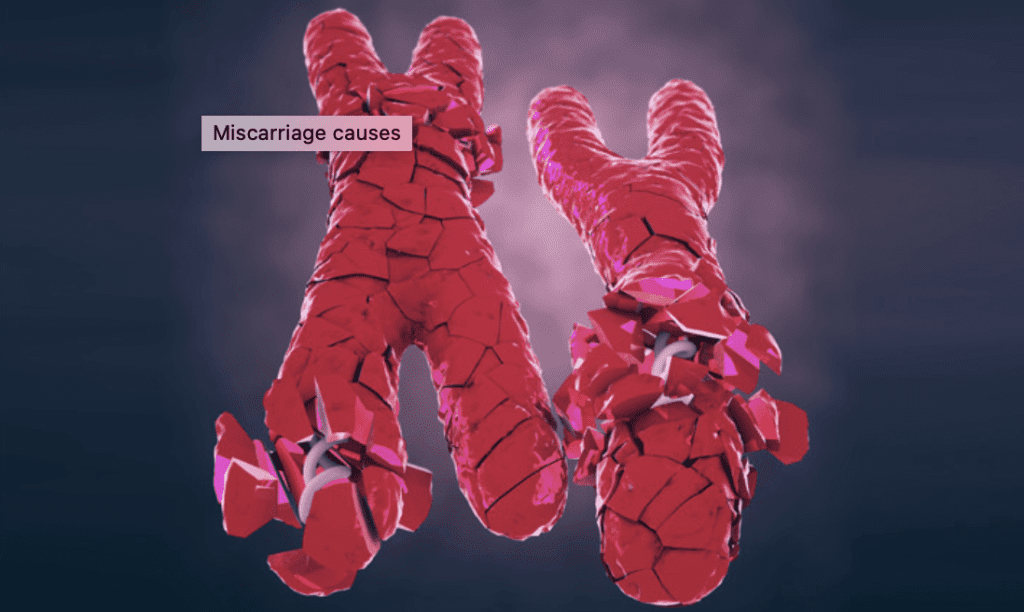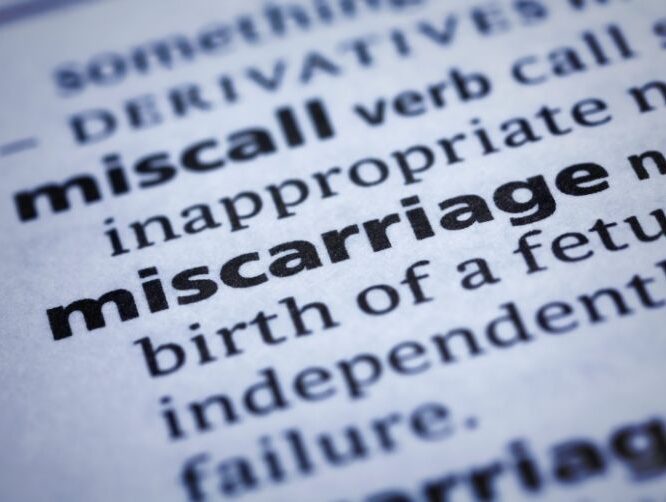About 10 – 20% of known pregnancies worldwide end in miscarriage. If you have miscarried before, it is important to know that in most cases you will be able to have a healthy pregnancy afterwards.
As a miscarriage often occurs within the first 3 months of a pregnancy, many people might think it is less traumatic than the loss of a pregnancy at a later stage of development, known as a stillborn baby. This is not always the case, and the loss of a baby at any stage of pregnancy is emotional and difficult for everyone involved. If you are pregnant or planning for a baby, it’s important to know the facts about miscarriages and where to seek help and treatment for both your physical and mental health.
Spontaneous abortion

The medical term for a miscarriage is a spontaneous abortion. The word spontaneous refers to the sudden nature of a miscarriage and the fact that it is not something that can be controlled. The symptoms of a spontaneous abortion, or miscarriage, include:
- Abdominal or back pain
- Blood loss, ranging from minimal to severe
- Cramping
- Feeling dizzy or faint
- Fever
- Passing clots or tissue
If you are pregnant and experiencing any of these symptoms, you should visit a hospital or a gynaecologist immediately.
Types of miscarriages
Miscarriages can be classified in a number of ways. Common classifications include:
- Complete miscarriage, where everything is expelled from the womb
- Threatened miscarriage, where blood loss occurs and a miscarriage may take place
- Blighted ovum, where a fertilised egg is implanted but never develops
- Recurrent miscarriage, where a woman has multiple miscarriages in a row
An ectopic pregnancy occurs when a fertilised egg implants somewhere not viable outside the womb such as the fallopian tube, abdominal cavity, or cervix. It is not considered a miscarriage because the pregnancy is unable to continue to full term. An untreated ectopic pregnancy can be a medical emergency. Early detection of an ectopic pregnancy can prevent serious medical complications and may save the fallopian tube from permanent damage.
Missed miscarriage

A miscarriage may also be classified as “missed”. This occurs when the embryo stops developing, but the body behaves as though the pregnancy is still ongoing. It usually doesn’t cause any of the typical symptoms of a miscarriage, which is why you won’t be aware that it is happening. Some women do have some discharge, or notice that some of their pregnancy symptoms such as nausea and breast tenderness lessen. However, it is likely that the loss of the pregnancy in this case will only be noted once you have a scan with your obstetrician. If there has been a missed miscarriage, your doctor will not be able to locate a heartbeat. Missed miscarriages are common, but the good news is, a missed miscarriage is not likely to happen twice.
Can you miscarry if you didn’t know you were pregnant?
Because miscarriages are much more common in the very early stages of pregnancy, within the first 12 weeks, many women have not experienced any of the typical signs of a pregnancy yet. They may not have been actively trying to get pregnant, and therefore will not have been watching closely for any symptoms, or taking regular pregnancy tests. The miscarriage may be the first sign that anything was different. Even if you are not aware of a pregnancy until a miscarriage occurs, it does not mean that the loss will not be difficult to deal with if it does happen. It’s still important to see your doctor and seek help and treatment.
Causes of miscarriage

In almost all cases, the exact cause of a miscarriage is unknown. It is very unlikely that your doctor will conduct any tests to find out the cause, unless you have had several (recurrent) miscarriages. In most cases, miscarriages are caused by:
- Chromosomal abnormalities in the foetus. This is by far the most common cause of pregnancy loss. If chromosomes are missing or damaged the foetus will most likely fail to develop, and there is nothing anyone can do to prevent this occurrence.
- Environmental or lifestyle hazards. Your lifestyle overall will not typically cause a miscarriage. However, excessive drinking, smoking or drug use can cause pregnancy loss. Living in a hazardous environment, with extreme levels of dangerous chemicals such as lead, pesticides or mercury may also have an impact.
- Medical conditions. Sometimes health problems in the mother such as diabetes, thyroid disorders, autoimmune conditions, and infections can cause a miscarriage. Reproductive issues with your cervix or uterus can also be responsible.
- There are certain factors that may put you more at risk of having a miscarriage. One of these is age. The older a woman is, the more likely a miscarriage is to occur. If you have had several miscarriages before, you are also more at risk. And, if you suffer from any conditions that affect pregnancy, this will also increase your risk of miscarriage.
Miscarriage treatment options
When you visit your doctor because of a miscarriage, they will conduct a full exam to ensure that the foetus is no longer viable. This will include a pelvic exam, ultrasounds and blood tests to check pregnancy hormone levels.
If you are having a threatened miscarriage, with vaginal bleeding, your doctor may prescribe you with progesterone as this may help to bring down the chances of a miscarriage. Progesterone is most commonly given orally or as an intramuscular injection.
If a miscarriage is diagnosed, you will usually not require any treatment, as your body will have most likely already expelled the tissue. If there is any remaining tissue left behind, your doctor may need to perform a small surgery to remove the remaining tissue in the uterus.
If you experience a missed miscarriage, your obstetrician will discuss and suggest a few treatment options best suited for you which may include:
- Expectant management – this is when you wait for your body to pass the tissue naturally, as in a complete miscarriage.
- Medical management – your doctor may offer you medication to start the miscarriage process.
- Surgical management – you may require surgery to remove the tissue, which is known as evacuation of uterus or dilation and curettage (D&C) surgery.
In all cases, you will need to take time to recover physically and emotionally from this process. You should get plenty of rest, and although it is not always easy to talk about miscarriage or pregnancy loss, talking to someone about it could be really helpful and may make you feel better.
After a miscarriage

If you experience a miscarriage, it is important to know that in most cases you will be able to have a healthy pregnancy afterwards. If you want to get pregnant again, most doctors recommend waiting to complete 1 or 2 normal menstrual cycles before trying.
If you have trouble getting pregnant after miscarriage or, if you experience more than 1 miscarriage in a row, known as recurrent miscarriage, seek help from a fertility specialist.
Staying in good health and looking after yourself are also good ways to encourage a successful pregnancy. You should:
- eat a balanced diet and ensure a good intake of vitamins and nutrients
- avoid smoking, drinking and drugs
- exercise regularly
- manage any existing medical conditions with your doctor, and take any prescribed medication
- reduce stress and focus on your mental well-being
It is important to remember that you are not to blame if a miscarriage occurs, and in most cases the loss is out of anyone’s control. If you think you may be experiencing a miscarriage, do not hesitate to consult your doctor.
Article reviewed by Dr Lim Min Yu, obstetrician & gynaecologist at Gleneagles Hospital
(Source)
Reference
Miscarriage. Retrieved 26/2/19 from https://www.healthline.com/health/miscarriage
4 Common Causes of Miscarriage. Retrieved 26/2/19 from https://www.webmd.com/baby/4-common-causes-miscarriage#2
Identifying and Treating a Missed Abortion. Retrieved 26/2/19 from https://www.healthline.com/health/pregnancy/missed-abortion
Miscarriage Signs and Symptoms. Retrieved 26/2/19 from https://www.healthxchange.sg/women/pregnancy/miscarriage-signs-symptoms
Pregnancy and Miscarriage. Retrieved 26/2/19 from https://www.webmd.com/baby/guide/pregnancy-miscarriage#2
The Basics About Miscarriage. Retrieved 26/2/19 from https://www.webmd.com/baby/understanding-miscarriage-basics#2
Treatment of Miscarriages. Retrieved 26/2/19 from https://www.webmd.com/baby/understanding-miscarriage-treatment#3
What is a missed miscarriage? Retrieved 6/3/19 from https://www.parents.com/pregnancy/complications/miscarriage/what-is-a-missed-miscarriage/




